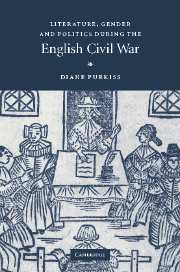Book contents
Conclusion
Published online by Cambridge University Press: 22 September 2009
Summary
A final story to inaugurate the process of summing up all the stories I have told: the last decisive battle of the war in the West, the battle of Lostwithiel, was fought on 2 September 1644. Charles and his Royalist forces had pushed Essex's army into the far West, and the infantry was eventually trapped on the west bank of the River Fowey. Many on both sides had hardly slept for eight days after a running guerilla war, fought in hedgerows and in ancient, abandoned neolithic forts; Charles I had himself slept under a hedge during the campaign. ‘Sometimes we argued together, sometimes we scolded together like Fishwomen of Cheapside, and sometimes we fought very hot’, wrote a member of Essex's guard, significantly evoking a metaphor that called such ungentlemanly battle into gender and class disrepute as well. At times, there were no battle lines as such; the confusion was so great that Royalist troops sometimes leapt eagerly into the midst of Parliamentarians, taking them for their own men. Finally, after many losses, the Parliamentarians surrendered: six thousand men, ten thousand weapons, and thirty-six cannon. The arrangement was that at 11 a.m. the rebels had to lay down their arms at Fowey Castle; those above the rank of corporal were to be allowed to keep their swords. Then there was supposed to be an orderly march past the king to Lostwithiel, but almost at once the scene degenerated into angry riot, as one Parliamentarian described:
For when we had laid down our arms, and come to march through the enemy's army, we were inhumanely dealt with; abused, reviled, scorned, torn, kicked, pillaged, and many stripped of all they had …
- Type
- Chapter
- Information
- Literature, Gender and Politics During the English Civil War , pp. 229 - 235Publisher: Cambridge University PressPrint publication year: 2005



